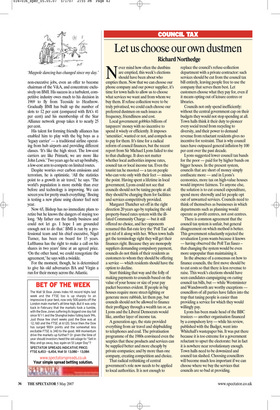Let us choose our own dustmen
Richard Northedge
Never mind how often the dustbins are emptied, this week’s elections should have been about who empties them. Now that we can choose our phone company and our power supplier, it’s time for town halls to allow us to choose what services we want and from whom we buy them. If refuse collection were to be truly privatised, we could each choose our preferred dustmen on such issues as frequency, friendliness and cost.
Local government gobbles billions of taxpayers’ money with no incentive to spend it wisely or efficiently. It imposes ‘amenities’, wanted or not, and compels us to pay for them. It’s time for a radical reform of council finances, but the recent report from Sir Michael Lyons failed to rise to that challenge. It does not matter whether local authorities impose rates, council tax or local income tax. Even the tourist tax he mooted — a tax on people who can vote only with their feet — misses the point. Having spent a lifetime in local government, Lyons could not see that councils should not be taxing people at all: they should be charging them for facilities and services competitively provided.
Margaret Thatcher set off in the right direction 20 years ago by replacing the old property-based rates system with the illfated Community Charge — but it still offered no choice, and her opponents renamed this flat-rate levy the ‘Poll Tax’ and got rid of it along with her. When town halls get the terminology right they will get their finances right. Because they are monopoly suppliers demanding compulsory payment, councils do not think of their residents as customers to whom they should be offering a service — which residents should have the option to decline.
Start thinking that way and the folly of making payments to councils based on the value of your house or size of your pay packet becomes evident. If people in big houses require more street-lighting or generate more rubbish, let them pay, but councils should not be allowed to finance their profligacy through a wealth tax or, as Lyons and the Liberal Democrats would like, another layer of income tax.
A generation ago, the state provided everything from air travel and shipbuilding to telephones and coal. The privatisation programme of the 1980s convinced even the sceptics that these products and services can be supplied better and more cheaply by private companies; and by more than one company, creating competition and choice.
That radical rethinking of central government’s role now needs to be applied to local authorities. It is not enough to replace the council’s refuse-collection department with a private contractor: such services should be cut from the council tax bill entirely, leaving people free to use the company that serves them best. Let customers choose what they pay for, even if it means opting out of leisure centres or libraries.
Councils not only spend inefficiently: without the central government cap on their budgets they would not stop spending at all. Town halls think it their duty to pioneer every social trend from recycling to diversity, and their power to demand revenue from reluctant residents gives no incentive for restraint. That is why council taxes have outpaced general inflation by 100 per cent over the past decade.
Lyons suggested lower council tax bands for the poor — paid for by higher bands on bigger houses. In the present system, councils that are short of money simply confiscate more — and in Lyons’s economics, more tax on high-value houses would improve fairness. To anyone else, the solution is to cut council expenditure, spend more shrewdly and let people opt out of unwanted services. Councils need to think of themselves as businesses in which departments such as planning would operate as profit centres, not cost centres.
There is common agreement that the council tax system is unfair, but general disagreement on which method is better. This government reluctantly rejected the revaluation Lyons wants because it knows — having observed the Poll Tax fiasco – that changing the system would be even more unpopular than maintaining it.
In the absence of a consensus on how to finance councils, the first move should be to cut costs so that there is less revenue to raise. This week’s elections should have seen candidates campaigning on cutting council tax bills, but — while Westminster and Wandsworth are worthy exceptions councillors of all parties have fallen into the trap that taxing people is easier than providing a service for which they would willingly pay.
Lyons has been made head of the BBC trustees — another organisation financed by a compulsory levy — while his review, published with the Budget, went into Whitehall’s wastepaper bin. It was put there because it is too extreme for a government reluctant to upset the electorate: but in fact it is nowhere near revolutionary enough. Town halls need to be downsized and council tax slashed. Choosing councillors will become much less important if we can choose where we buy the services that councils are so bad at providing.


































































































 Previous page
Previous page